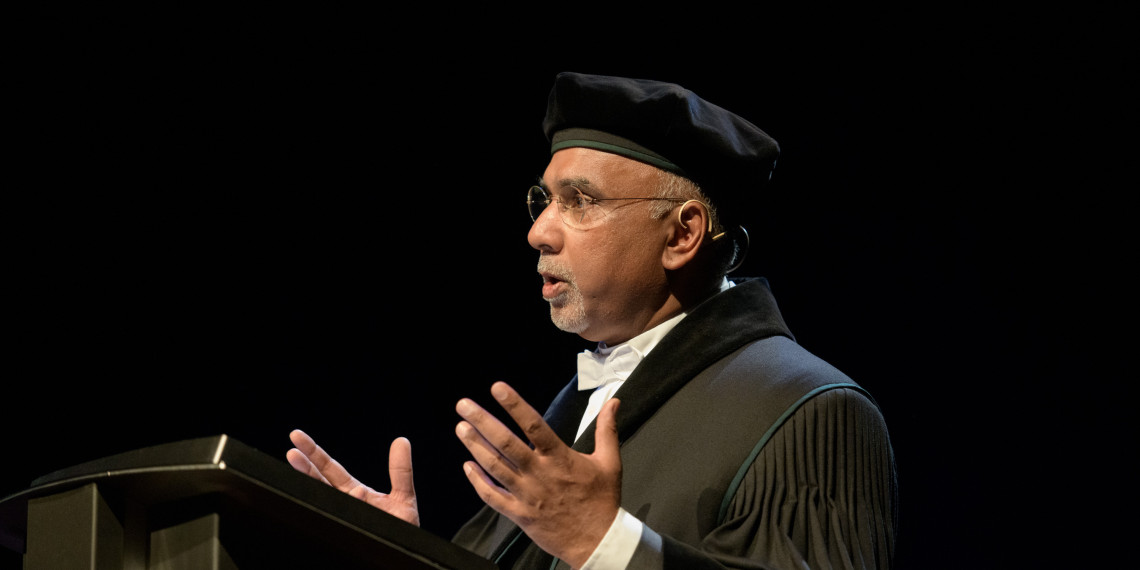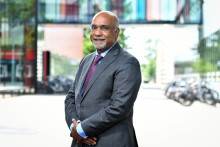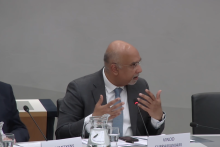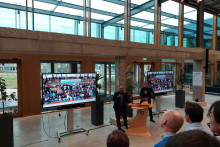How do you look back on this year?
‘When I took up this position, I felt I was ready for a new learning curve. And well, that’s exactly what I got this year. I’ve learnt a lot and that’s a good thing. This might well be the most interesting time to be a university administrator. Much has happened in 2023; there were many things going on and we didn’t always know how they would play out. That leads to a certain uncertainty. We had to think in terms of scenarios. Earlier, that might have meant an increase or decrease of a few percent, but now we also have to consider drastic scenarios. Suppose we will no longer have any international students in our bachelor’s programmes, what does that mean for us?’
You mentioned that you learnt a lot this year. Can you give an example?
‘About political dynamics, but also about the education system itself. The biggest lesson was that we need to show society even more clearly what we do as a university, and what value we add. The campus is something of an island. Many people from the region only visit the campus to play sports, but we want to show what other amazing things we do here. We want to be the pride of the region. Recently, we welcomed members of the Overijssel Provincial Executive at our university. Many of the new administrators barely knew about UT, so it was an eye-opener for them.’
'In a country with coalition politics, it’s difficult to look into a crystal ball'
You started the year with a call for harmony. Was this put under pressure by the developments in 2023?
‘I don’t think so, but the contrast in society has grown. So as an administrator, I feel called to point out our values to the community. We’re in this together. In my opinion, the developments – I'll take the financial challenge as an example – actually lead to greater unity. I feel a greater need to solve this together. Wir schaffen das. We need each other, especially under pressure.’
In early 2023, you were part of a working group prior to Minister Dijkgraaf’s letter. Were your efforts in The Hague fruitful?
‘I think much of the letter’s content was derived from our input, so the efforts were not in vain. The strength of the discussions lay in the interaction, the two-way communication. The discussions also revolved around forces at play in The Hague and you have to be able to deal with that carefully. You can sense that the political landscape is changing and you have to be well aware of that. In a country with coalition politics, it’s difficult to look into a crystal ball, and the same applies to the question of how we should respond.’

The majority of the Lower House - from left to right - wants to offer bachelor’s programmes in the Dutch language. Do those parties have valid arguments? Has the UT perhaps gone too far in its anglicisation?
‘It’s always a quest for balance, which is reflected in the very name of the bill: Internationalisation in Balance. Two important points have to be considered here. First, we are the smallest university in the country, with small programmes, located near the border of the country. How does that affect the choice of the language of instruction? Second is the national picture. Sometimes arguments overlap. There are issues regarding housing, especially in the west. I don’t think a language measure in education will solve these issues. What I’m trying to say is: a blanket measure rarely works. We need nuance, but that’s difficult in a political discussion about the entire system. Still, it feels like our duty to provide nuance.’
'The figures don’t lie: we’re not educating enough technical staff'
Isn’t this discussion mainly about securing our own position? After all, as the UT, we have to survive within the system.
‘It’s certainly about the right to exist, but I’m not worried about our survival. We might be a small university, but we’re also a strong one. I have faith in our resilience. We’re called ‘the entrepreneurial university’ for a reason; we’ll find a solution. My opinion on the higher education funding system is well known. I believe the question of what this country needs should be central. Not all solutions are found in technology, but it is an important part.
The figures don’t lie: we’re not educating enough technical staff. The demand exceeds the supply by a lot. So my logical conclusion is: we need to train more students. A long-term solution would be to encourage young people to choose a technical route, but it would take about 15 to 20 years for the effect to work. In the short term, you need international talent. And according to CBS data, that group makes a net positive contribution to the Dutch economy.’
As a middle ground in the discussion on language policy, a two-track language policy has been suggested. What are your thoughts?
‘During my time as rector of the Vrije Universiteit, we offered psychology in two tracks, English and Dutch. We saw that almost all Dutch students opted for the English track. So in what situation would two tracks be useful? Volume is of great importance. Two tracks might make sense for a large programme, but for small programmes, it simply doesn’t work. But it must not lead to unmanageable workload in any case. The challenge lies in its feasibility, the lecturer’s side must be leading. Here too, customisation is key; a blanket measure is usually not the best option.’
In view of the financial situation at UT, what characterises your approach as the Executive Board?
‘I think of it as a team approach. Not just between us as a board, but in all the conversations we conduct: with the deans, service department directors, faculty boards and the strategic council. What applies to the internationalisation debate also applies to finances: the local context matters. We have our basic principles, such as a very strict vacancy policy and careful monitoring of other expenses. And in addition to that, we have to allow for customisation.
'Whether the sense of urgency has permeated every corner of the workplace, I don't think so'
As the board, we hold up a mirror, make adjustments and say no from time to time. The starting point is not that we make the decisions and the faculties and service departments must simply accept it. We say: listen friends, this is the problem and we have to solve it together. Then we give them space, both on an administrative level and individually. But given the current situation, we do have to be more responsive.’
Do you feel that the organisation is sufficiently aware of the urgency of the situation? Or do you notice people are digging in their heels?
‘Let me put it this way: I haven’t noticed people digging in their heels, but I do see that the level of awareness about the urgency varies. What I’ve read and heard is that there are different views on the feasibility of the cost-cutting plans. We think the goals are challenging, but achievable. Although I can imagine there are questions about the path to get there. We simply have our work cut out for us. The urgency is clear among higher management now, but whether it has permeated every corner of the workplace, I don’t think so. That requires even more layers of communication; not only from the board, but within departments, between staff and management... The local context requires a local conversation.’
The day after the elections, you wrote a letter in which you also stated that you were personally affected. What did the election results mean to you?
‘First of all, it was not a political statement about the election result. But I did realise, especially in the context of the debate on internationalisation, that this would cause more uncertainty for our community. I’ve lived in the Netherlands for 19 years now, I was warmly welcomed and have become part of the system. And I must add that learning the language has helped me get to where I am today.
I felt it was important to offer encouragement to students and staff who were feeling uncertain. Because for me, it’s a case of ‘been there, done that’. Look, I don’t believe that we will immediately feel the consequences. But I did read through all the party programmes and saw that many parties want to handle education, research and innovation differently. Even the VVD wants to cut into the Growth Fund. That is why it’s so important to send a signal that we’re welcoming and inclusive at this university.’

Even if that is being put under pressure? How flexible is such a statement to remain a welcoming and inclusive community?
‘No matter what direction the outside world may take, it doesn’t change our core values. We are an inclusive community, and that’s that. Of course, the consequences can be far-reaching, but our core values will remain intact. I stand by my previously stated mission, to create a certain energy here. ‘The smell of the place’, as Sumantra Ghoshal called it. Of course the discussions surrounding internationalisation and our finances are intense, but that actually energises me. And that’s because I’m working with a community that is doing its utmost to train young people and have them conduct impactful research. These are challenging times and I don’t have all the answers, but we’re in this together.’
'Let’s collectively put our shoulders to the wheel. We’re in this together'
You started in the middle of the Covid-19 crisis, then the war in Ukraine broke out, the discussion on internationalisation flared up, and now there are major financial challenges. Don’t you long for calmer waters?
‘A little calmer would be nice, but I wouldn't want to get bored. What I’d like is for the organisation to have more time to unfold, grow and develop. But that doesn’t necessarily mean we can take things easier, we’ll have to work just as hard. Maybe I’m not hoping for calmer times as much as clearer times.’
Is that in the cards for the UT in 2024? What kind of year are we heading into?
‘I’m hoping for clarity, in the sense that we want to know what lies ahead for us. 2024 will undoubtedly be an exciting year for this university. And at the same time, I see a resilient community; one that does have questions and demands attention. However, my crystal ball is as clear as yours. What I do see is a resilient and creative community that has proved it can pull through a crisis, as was evident after the Covid-19 crisis.’
Does that sum up your ‘Christmas message’ to the UT community?
‘Absolutely. You have been of great help to me this year. I’m full of confidence and only gain energy from all the students and staff. Let’s collectively put our shoulders to the wheel. We’re in this together. And above all, enjoy the holidays with your loved ones. There’s always work to be done, but the most important thing is the time you spend with the people around you.’







